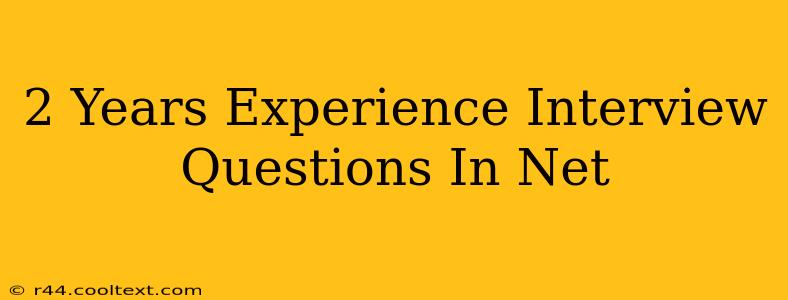2 Years Experience Interview Questions in .NET: Ace Your Next Interview
Landing that perfect .NET developer role after two years of experience requires meticulous preparation. This guide outlines common interview questions, categorized for clarity, to help you ace your next interview. We'll cover fundamental concepts, practical scenarios, and even delve into some more advanced topics to showcase your growth and expertise.
I. Core .NET Fundamentals:
This section focuses on the bedrock of .NET development. Solid understanding here demonstrates a strong foundation.
-
What is the difference between
==and.Equals()in C#? This classic question tests your understanding of value types vs. reference types and object comparison. Explain the nuances carefully, highlighting situations where each operator is appropriate. Mention immutability of strings and how that affects comparison. -
Explain the concept of garbage collection in .NET. Describe how the garbage collector works, different generations of garbage collection, and the impact on application performance. Discuss techniques to optimize garbage collection, such as weak references and proper object disposal.
-
What are delegates and events in C#? Provide real-world examples. This tests your knowledge of event-driven programming. Clearly explain the purpose of delegates, their relationship to events, and how they enable loose coupling. Use examples like button clicks or data changes to illustrate the concepts.
-
Describe different types of exception handling in C#. Explain
try-catch-finallyblocks, custom exceptions, and the importance of proper error handling. Discuss best practices for logging exceptions and preventing crashes. Mention specific exception types likeNullReferenceExceptionandArgumentException, and how to anticipate and handle them.
II. Practical Application & Problem-Solving:
This section assesses your ability to apply your .NET knowledge to real-world scenarios.
-
Describe a challenging project you worked on and the problems you encountered. Choose a project that showcases your problem-solving skills. Focus on the technical challenges, your approach to solving them, and the results you achieved. Quantify your success whenever possible (e.g., "reduced error rate by 20%").
-
How would you design a RESTful API using ASP.NET Web API? Explain the key principles of REST (Representational State Transfer) and how you would design the API endpoints, HTTP methods (GET, POST, PUT, DELETE), and data serialization (JSON or XML). Mention considerations for security and scalability.
-
Explain your experience with database interaction using Entity Framework Core (or ADO.NET). Detail your experience with ORM (Object-Relational Mapping) tools. Describe how you've used them to interact with databases, including data access strategies, LINQ queries, and database design considerations.
-
How do you handle concurrency and threading in .NET applications? Discuss different approaches like using
lockstatements,async/await, and theTaskclass. Explain the importance of thread safety and how to avoid race conditions and deadlocks.
III. Advanced Topics (Depending on the Role):
These topics might be explored depending on the seniority and specific requirements of the role.
-
Explain your experience with design patterns (e.g., Singleton, Factory, MVC). Demonstrate understanding of common design patterns and when to apply them. Explain how these patterns improve code organization, maintainability, and scalability.
-
Discuss your experience with testing methodologies (unit testing, integration testing). Showcase your knowledge of testing frameworks like NUnit or xUnit and describe your approach to writing effective unit and integration tests. Mention code coverage and best practices for writing testable code.
-
Explain your knowledge of dependency injection and its benefits. Discuss the principles of dependency injection, its implementation using tools like Autofac or .NET's built-in dependency injection container, and how it enhances code modularity, testability, and maintainability.
IV. Behavioral Questions:
These questions assess your soft skills and how you work in a team.
-
Describe your teamwork experience. Provide specific examples of collaborative projects, highlighting your contributions and how you worked effectively with others.
-
How do you handle stress and pressure in a demanding work environment? Demonstrate your ability to remain calm and focused under pressure and describe your strategies for managing workload and deadlines.
-
Tell me about a time you failed. What did you learn from it? Show self-awareness and a growth mindset by discussing a past mistake, what you learned from it, and how you have improved since.
By thoroughly preparing for these types of questions, you'll significantly increase your chances of securing your desired .NET developer role. Remember to showcase your passion for .NET development, your eagerness to learn, and your ability to solve problems creatively and efficiently. Good luck!

